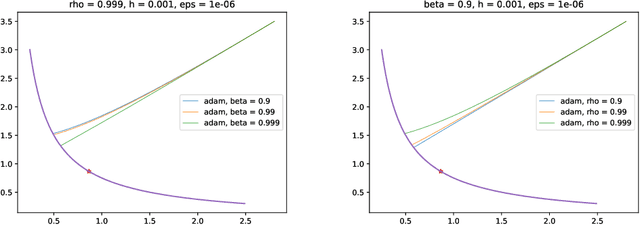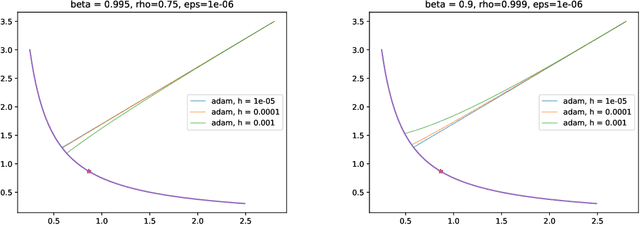Boris Shigida
The Effect of Mini-Batch Noise on the Implicit Bias of Adam
Feb 02, 2026Abstract:With limited high-quality data and growing compute, multi-epoch training is gaining back its importance across sub-areas of deep learning. Adam(W), versions of which are go-to optimizers for many tasks such as next token prediction, has two momentum hyperparameters $(β_1, β_2)$ controlling memory and one very important hyperparameter, batch size, controlling (in particular) the amount mini-batch noise. We introduce a theoretical framework to understand how mini-batch noise influences the implicit bias of memory in Adam (depending on $β_1$, $β_2$) towards sharper or flatter regions of the loss landscape, which is commonly observed to correlate with the generalization gap in multi-epoch training. We find that in the case of large batch sizes, higher $β_2$ increases the magnitude of anti-regularization by memory (hurting generalization), but as the batch size becomes smaller, the dependence of (anti-)regulariation on $β_2$ is reversed. A similar monotonicity shift (in the opposite direction) happens in $β_1$. In particular, the commonly "default" pair $(β_1, β_2) = (0.9, 0.999)$ is a good choice if batches are small; for larger batches, in many settings moving $β_1$ closer to $β_2$ is much better in terms of validation accuracy in multi-epoch training. Moreover, our theoretical derivations connect the scale of the batch size at which the shift happens to the scale of the critical batch size. We illustrate this effect in experiments with small-scale data in the about-to-overfit regime.
Modified Loss of Momentum Gradient Descent: Fine-Grained Analysis
Sep 10, 2025Abstract:We analyze gradient descent with Polyak heavy-ball momentum (HB) whose fixed momentum parameter $\beta \in (0, 1)$ provides exponential decay of memory. Building on Kovachki and Stuart (2021), we prove that on an exponentially attractive invariant manifold the algorithm is exactly plain gradient descent with a modified loss, provided that the step size $h$ is small enough. Although the modified loss does not admit a closed-form expression, we describe it with arbitrary precision and prove global (finite "time" horizon) approximation bounds $O(h^{R})$ for any finite order $R \geq 2$. We then conduct a fine-grained analysis of the combinatorics underlying the memoryless approximations of HB, in particular, finding a rich family of polynomials in $\beta$ hidden inside which contains Eulerian and Narayana polynomials. We derive continuous modified equations of arbitrary approximation order (with rigorous bounds) and the principal flow that approximates the HB dynamics, generalizing Rosca et al. (2023). Approximation theorems cover both full-batch and mini-batch HB. Our theoretical results shed new light on the main features of gradient descent with heavy-ball momentum, and outline a road-map for similar analysis of other optimization algorithms.
How Memory in Optimization Algorithms Implicitly Modifies the Loss
Feb 04, 2025Abstract:In modern optimization methods used in deep learning, each update depends on the history of previous iterations, often referred to as memory, and this dependence decays fast as the iterates go further into the past. For example, gradient descent with momentum has exponentially decaying memory through exponentially averaged past gradients. We introduce a general technique for identifying a memoryless algorithm that approximates an optimization algorithm with memory. It is obtained by replacing all past iterates in the update by the current one, and then adding a correction term arising from memory (also a function of the current iterate). This correction term can be interpreted as a perturbation of the loss, and the nature of this perturbation can inform how memory implicitly (anti-)regularizes the optimization dynamics. As an application of our theory, we find that Lion does not have the kind of implicit anti-regularization induced by memory that AdamW does, providing a theory-based explanation for Lion's better generalization performance recently documented.
On the Implicit Bias of Adam
Aug 31, 2023



Abstract:In previous literature, backward error analysis was used to find ordinary differential equations (ODEs) approximating the gradient descent trajectory. It was found that finite step sizes implicitly regularize solutions because terms appearing in the ODEs penalize the two-norm of the loss gradients. We prove that the existence of similar implicit regularization in RMSProp and Adam depends on their hyperparameters and the training stage, but with a different "norm" involved: the corresponding ODE terms either penalize the (perturbed) one-norm of the loss gradients or, on the contrary, hinder its decrease (the latter case being typical). We also conduct numerical experiments and discuss how the proven facts can influence generalization.
 Add to Chrome
Add to Chrome Add to Firefox
Add to Firefox Add to Edge
Add to Edge